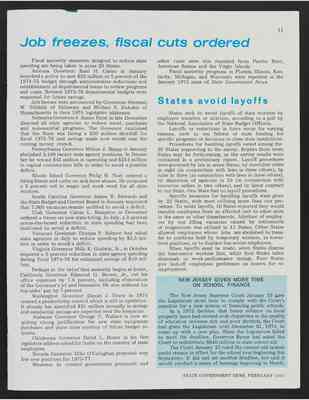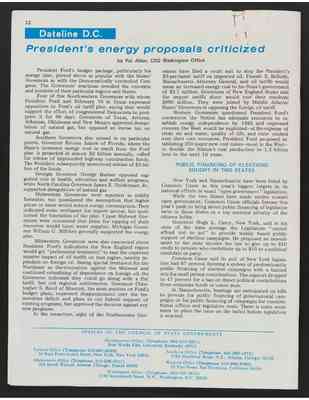Pages
26
11 Job freezes, fiscal cuts ordered
[two columns] [first column] Fiscal austerity measures desinged to reduce state spending are being taken in some 20 States.
Arizona Governor Raul H. Castro in January launched a policy to save $20 million or 5 percent of the 1974-75 budget through admiinistrative reductions and establishment of deparmental teams to review programs and costs. Revise 1975-76 departmental budgets were requested for future savings.
Job freezes were announced by Governors Sherman W. Tribbit of Delaware and Michael S. Dukakis of Massachusetts in their 1975 legislative address.
Nebraska Governor J. James Exon in late December directed all state agencies to reduce travel, purchases and nonessential programs. The Governor cautioned that the State was facing a $50 million shortfall for fiscal 1975-76 and savings made now would ease the coming money crunch.
Pennsylvania Governor Milton J. Shapp in January abolished 2,400 vacant state agency positions. In December he voted $41 million in operating and $214 million in capital construction bills in order to avoid a possible deficit.
Rhode Island Govenor Philip W. Noel opened a hiring freeze and curbs on sick leave abuses. He proposed a 5 percent cut in wages and work week for all state workers.
South Carolina Governor James B. Edwards and the State Budget and Control Board in January requested that 7,000 vacancies remain unfilled to avoid a defict.
Utah Governor Calvin L. Rampton in December ordered a freeze on a new state hiring. In July, a 3 percent across-the-board reduction in state spending had been insituted to avoid a deficit.
Virginia Governor Mills E. Godwin, Jr., in October required a 3 percent reduction in state agency spending during fiscal 1974-76 for estimated savings of $40 million
Perhaps in the belief that austerity begins at home, California Governor Edmond G. Brown, Jr. cut his office expenses by 7.6 percent, including elimination of the Governor's jet and limousine. He also reduced his top aides' pay by 7 percent.
Washington Governor Daniel J. Evans in 1974 created a productivity council which is still in operation. It alread had identified $21 million annually in savings and substantail savings are expected over the biennium.
Alabama Governor George C. Wallace is now requiring strong justification for new state equipment purchases and plans close scrunity of future budget requests.
Oklahoma Governor David L. Boren in his first legislative address asked for limits on the number of state employees.
Nevada Governor Mike O'Callaghan proposed very for new positions for 1975-77.
Measures to control government personnel and
[second column] other costs were also reported from Puerto Rico, American Samoa and the Virgin Islands.
Fiscal austerity programs in Florida, Illinois, Kentucy, Michigan, and Wisconsin were reported in the January 1975 issue of State Government News.
States avoid layoffs
States seek to avoid layoffs of state workers by employee transfers or attrition, according to a poll by the National Association of State Budget Officers.
Layoffs or reduction in force occur for varying reasons, such as less federal or state funding for specific programs of decisions to close state institutions.
Procedures for handling layoffs varied among the 30 States responding to the survey. Replies from more States may be forthcoming, as the survey results were contained in a preliminary report. Layoff procedures were governed by law in seven States, by executive order in eight (in conjunction with laws in three others), by discretion of agencies in 10 (in conjunction with executive orders in two others), and by labor contract in one State. One State had no layoff procedures.
Specific measures of handling layoffs were given by 22 States, with most utilizing more than one procedure. To avoid layoffs, 16 States reported they would transfer employees from an affected unit to other units in the same or other departments. Attrirition of employees by not filling vacancies caused by retirements or resignations was utilized in 11 States. Other States allowed employees whose jobs are abolished to transfer to positions held by temporary workers, to lower-level postions, or to displace less seniot employees
When layoffs must be made, seven State dismiss the least-senior workers first, while four States tailor dismissals to work-performance ratings. Four States give laid-off employees preference on roster for re-employment.
NEW JERSEY GIVEN MORE TIME ON SCHOOL FINANCE
The New Jersey Supreme Court January 23 gave the Legislature more time to comply with the Court's mandate for a new system of financing public schools.
In a 1973 decision that heavy reliance on local propery taxes had created wide disparities in the quality of education between rich and poor districts, the Court had given the Legislature until December 31, 1974, to come up with a new plan. When the Legislature failed to meet the deadline, Governor Byrne had asked the Court to redistribute $640 million in state school aid.
The Court January 23 ruled the current ais system could remain in effect for the school year beginning this Septemeber. It did not set another deadline, but said it would conduct a series of hearing beginning in March.
STATE GOVERNMENT NEWS, FEBRUARY 1975
27
12 Dateline D. C. President's energy proposals criticized by Pat Allen, CSG Washington Office
[two columns] [first column] President Ford's budget package, particularly his energy plan, proved about as popular with the States' Governors as with the Democratically controlled Congress. The Governors' reactions revealed the concerns and interests of their paricular regions and States.
Four of the five Southwestern Governors with whom President Ford met Friday 10 in Texas expressed oppostition to Ford's oil tariff plan, saying they would support the effort of congressional Democrats to postpone it for 90 days. Governors of Texas, Arizon, Arkansas, Oklahom and New Mexico approved deregulation of natural gas, but opposed an excise tax on natural gas.
Southern Governors also zeroed in on particular points. Governor Reubin Askew of Florida, where the plan is projected at almost $2 billion annually, called for release of impounded highway construction funds. The President subsequently announced release of $2 billion of the funds.
Georgia Governor George Busbee, opposed suggested cuts in health, education and welfare programs, supported deregulation of natural gas.
Midwestern Governors were reported as midly favorable, but questioned the assumption that higer prices or taxes would reduce energy consumption. The indicated some sentiment for import quotas, but questioned the timetables of the plan. Upper Midwest Governors were concerned that plans for tapping oil shale resources would harm water supplies. Michigan Governor William G. Miliken generally supported the energy plan.
Midwestern Governors were also concerned about President Ford's indications the New England region would get "preferential treatment" to ease the expected massive impact of oil tariffs on that region, heavily dependent on goreign oil. Seeing special treatment for the Northeast as discrimination against the Midwest, and Governors indicated they could go along wwith a flat tariff, but not regional entitlements. Governor Christopher S. Bond of Missouri, the most positive on Ford's budget plans, expressed disappointmen over the tremendous deficit and plans to cut federal support of existing programs, but approved the decision against any new programs.
In the meantime, eight of the Northeastern Governors
[second column] have filed a court suit to stop the President's #3-per-barrel tariff on imported oil. Francis X. Bellotti, Massachusetts Attorney General, said oil tariffs would mean an increased energy cost to his State's government of $2.7 million. Governors of New England States said the import tariffs alone would cost their residents $890 million. They were joined by Middle Atlantic States' Governors in opposing the foreign oil tariff.
Western Governors questione President Ford's contention the Nation has adequate resources to establish energy independence by 1985 and expressed concern the West would be exploited-at the expense of clean air and water, quality of life, and state control over their own resources. President Ford proposed establishing 250 major new coal mines - most in the West-to double the Nation's coal production to 1.2 billion tons in the next 10 years.
PUBLIC FINANCING OF ELECTIONS SOUGHT IN TWO STATES
New York and Massachusetts have been listed by Common Cause as this year's biggest targets in its national efforst to enact "open government" legislation.
While the two States have made strides toward open government, Common Cause officials foresee this year's push to bring about public financing of legislative races in those States as a top national priority of the citizens lobby.
Governor Hugh L. Carey, New York, said in his state of the state message the Legislatute "cannot afford out to act" to provide widely based public support of election campaigns. He proposed an amendment to the state income tax law to give up to $10 to a political candidate or party.
Common Cause said its poll of New York legislators had 67 percent favoring a system of predominantly public financing of gubernatorial campaigns or for public financing of campaigns for constitutonal offices and legislative seats. There is some sentiment to place the issue on the ballor beofre legislation is enacted.
OFFICES OF THE COUNCIL OF STATE GOVERNMENTS Headquaters Office (Telephone: 606-252-2291) Iron Works Pike, Lexington, Kentuck 40511 [two columns] [first column] Eastern Office (Telephone: 212-687-0559) 36 West Forty-fourth Street, New York, New York 10036 Midwestern Office (Telephone: 312-236-4011) 203 North Wabash Avenue, Chicago, Illinois 60601
[second column] SOUTHERN OFFICE (Telephone: 404-266-1271) 3384 Peachtree Road, N.E. Atlanta, Georgia 30326 Western Office (Telephone: 415-988-3760_ 85 Post Street, San Francisco, California 94104
Western Office (Telephone: 202-785-5810) 1150 Seventeenth Street, N.W., Washington, D.C. 20016
Washington Office (Telephone 202=785-5610) 1150 Seventeenth Street. N. W. Washington, D. C. 20036

